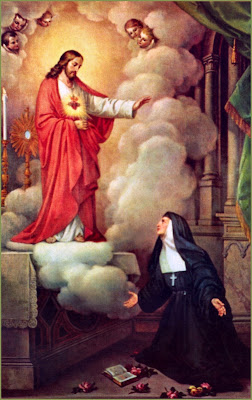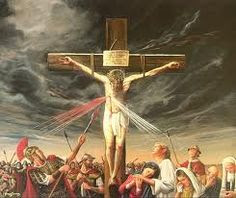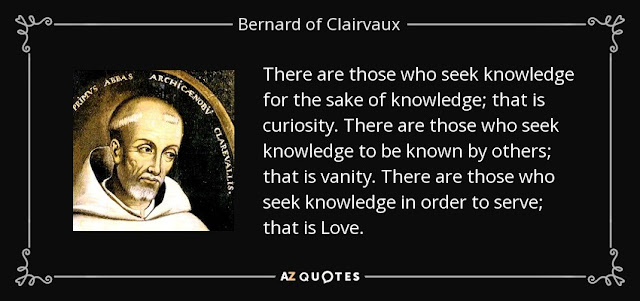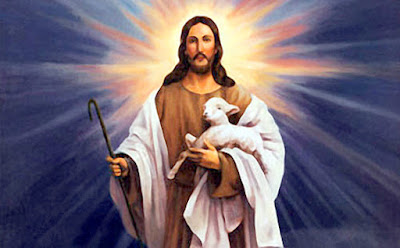 |
| Sacred Heart of Jesus |
Sacred
Heart of Jesus
Meditation
Devotion to the Sacred Heart, as we know it, began about the
year 1672. On repeated occasions, Jesus
appeared to Saint Margaret Mary Alacoque, a Visitation nun, in France, and
during these apparitions He explained to her the devotion to His Sacred Heart
as He wanted people to practice it. He
asked to be honored in the symbol of His Heart of flesh; he asked for acts of
reparation, for frequent Communion, Communion on the First Friday of the month,
and the keeping of the Holy Hour.
 |
| Jesus Sacred Heart St. Margaret Mary Alacoque |
When the Catholic Church approved the devotion to the Sacred
Heart of Jesus, she did not base her action only on the visions of St. Margaret
Mary. The Church approved the devotion
on its own merits.
There is only one Person in Jesus, and that Person was at
the same time God and Man. His Heart,
too, is Divine—it is the Heart of God.
There are two things that must always be found together in
the devotion to the Sacred Heart: Christ’s
Heart of flesh and Christ’s love for us.
True devotion to the Sacred Heart means devotion to the Divine Heart of
Christ in so far as His Heart represents and recalls His love for us.
In honoring the Heart of Christ, our homage lingers on the
Person of Jesus in the fullness of His Love.
This love of Christ for us was the moving force of all He did and
suffered for us—in Nazareth, on the Cross, in giving Himself in the Blessed
Sacrament, in His teaching and healing,
in His praying and working. When we
speak of the Sacred Heart, we mean Jesus showing us His Heart, Jesus all love
for us and all lovable.
 |
| The Most Sacred Heart of Jesus |
Jesus Christ is the incarnation of God’s infinite love. The Human Nature which the Son of God took
upon Himself was filled with love and kindness that has never found an
equal. He is the perfect model of love
of God and neighbor.
Every day of His life was filled with repeated proofs
of “Christ’s love which surpasses all knowledge”
(Eph 3:19). Jesus handed down for all
times the fundamental feature of His character:
“Take My yoke upon your shoulders and learn from Me, for I am gentle and
humble of Heart.” (Mt 11:29). He invited
all, refusing none, surprising friends and rivals by His unconditional
generosity. He called out, “Come to Me,
all you who are weary and find life burdensome, and I will refresh you.” (Mt
11:28).
The meaning of love in the life of Jesus was especially
evident in His sufferings. Out of love
for His Father He willed to undergo the death of the Cross. “The world must know what I love the Father
and do as the Father has commanded Me” (Jn 14:31).
The love that Jesus bore toward us also urged Him to undergo
the death of the Cross. As the Last
Supper, He said, “There is no greater love than this: to lay down one’s life
for one’s friends.” (Jn 15:13).
What enhances Christ’s love is the sovereign liberty with
which He offered Himself. He said, “The
Father loves Me for this: that I lay down My life to take it up again. No one takes it from Me; I lay it down
freely. I have power to lay it down, and
I have power to take it up again. This
command I received from My Father” (Jn 10:17-18).
 |
| Christ praying at the Last Supper |
Jesus loved people because they belonged to His Father. Before He died He prayed, “For these I pray—not
for the world but for these You have given Me, for they are really Yours” (Jn
17:9). He did mankind much good for God’s
sake, seeing in every person a child of God and the image of His Father.
He loved people for His own sake, because they were really
so much in need of help, and because He wished to win them over to His teaching by His innumerable favors.
When we see Jesus lavishly offering inexhaustible treasures
of compassion and mercy, we are able to conceive something of the immensity of
that ocean of Divine kindness and love from which the Sacred Heart of draws
these treasures for us.
The Heart of Jesus never ceases to love us in heaven. He sanctifies us through the sacraments. These are inexhaustible fountains of grace
and holiness which have their source in the boundless ocean of the Sacred Heart
of Jesus.
The Solemnity of the Sacred Heart of Jesus is celebrated on
the Friday following the Second Sunday after Pentecost.
The Word of God
“This is the covenant which I will make with the house of
Israel after those days, says the Lord. I will place My law within them, and write it
upon their hearts; I will be their God, and they shall be My people.” -- Jeremiah 31:33
“Take My yoke upon your shoulders and learn from Me, for I
am gentle and humble of Heart.” – Matthew 1:28
“I have come to light a fire on the earth. How I wish the blaze were ignited!” – Luke 12:49
 |
| Christ pierced by a lance |
“When they came to Jesus and saw that He was already dead,
they did not break His legs. One of the
soldiers thrust a lance into His side, and immediately blood flowed out.” –
John 19:34
Taken from Treasury of Novenas, by Rev. Lawrence G. Lovasik, SVD, Catholic Book
Publishing Company, New York USA









